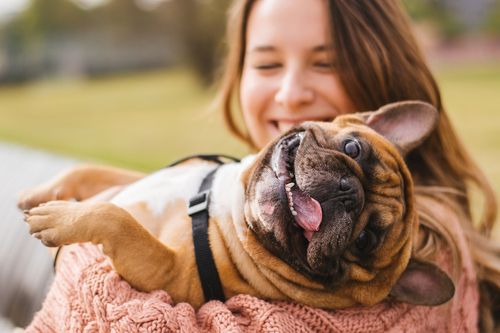For many people, getting a dog seems like an exciting idea. While dog ownership can be fun, it is a responsibility and a commitment too. Here are four important things to remember if you are getting your first dog.

Choosing the Right Dog Is Key
There are thousands of dog breeds, mixed breed combinations, and canine personalities out there. When you select a dog, you want to make sure you put adequate time into thinking about what kind of dog is best for your household.
Some questions to ask include:
- How much indoor space do you have for a dog?
- What is your outside area like–do you have a fenced yard, a patio, or no outdoor space at all?
- What is your daily schedule like–do you have time for walks and care?
- What activities do you enjoy doing in your spare time?
- Do you have young children in the home?
- What is your tolerance for mess, hair, noise, etc.?
- Do you have any experience with dogs?
- What is your budget for getting a pet?
Space
You want to make sure you have sufficient space for a dog in your home, both indoors and out. If you live in a high-rise apartment or a tiny home, generally a small dog will work out better. If you have no yard, you need to plan on walking your dog every time it needs to relieve itself, and you’ll have to find a park for off-leash play.
Time
We’ll talk more about exercise and daily care below, but first, think about your routine. You need to be certain you have extra time for feeding and exercising a dog, plus some time for training and bonding. If you leave the home early in the morning and don’t come home until late at night, you will need a dog walker or doggy daycare in your absence. Unless someone is home during the day in your house, it can be hard to raise a puppy, who will need constant supervision, a lot like a toddler would.
Activities
Are you an active person who likes to run, camp, and ski, or do you prefer more sedentary activities? Your free time lifestyle will have a lot of say in what kind of dog will suit you best. For example, a Labrador retriever or Alaskan Malamute will love spending all day outdoors romping with you, whereas a Cavalier King Charles Spaniel or Chihuahua is perfect if you want a lap dog to snooze on the sofa with you.
Kids
If you have young children in the home, you should think about getting a dog breed that’s easy going, easy to train, and tolerant of lots of contact. Remember, it’s not just your child’s safety at stake but also the safety of any visiting young friends who may not know how to interact with a dog. Smaller dogs aren’t always the most child friendly, in spite of their size. Some of the gentlest dogs include Newfoundlands, Golden retrievers, and Irish setters, all large dogs that are considered good-natured and make excellent family pets.
Mess
Dogs can be messy, whether they’re shedding hair, slobbering at the water bowl, or chewing a bone. If you like an immaculate home, think about a dog that spends more time indoors and doesn’t shed a lot (also a consideration for allergies). You can also minimize the potential for a mess by defining human-only zones in your home (see below). Dogs with longer hair will need grooming, and dogs with larger jowls tend to drool more.
Experience
Your prior experience with dogs should come into play in selecting your pet too. If you are timid or not comfortable with all dogs, stay away from dominant breeds like Rottweilers and Doberman Pinschers. While easy to train because of their intelligence, these breeds can also be rather pushy with novice dog owners.
Budget
How much do you plan to spend on your dog? Getting a purebred dog from a breeder may seem ideal, but unless you plan to show the dog, it’s rarely necessary. If you have your heart set on a purebred dog, call your local kennel club or veterinarian for suggestions about reputable breeders.
Breed rescues, animal shelters, and humane societies are good sources for dogs. They charge nominal fees for adoption. Plus, they will have vetted the pets there, which means they can help you select one that’s right for your personality and level of experience.
Other costs include:
- Food, treats, and bowls
- Collar and leash
- Bedding
- Crate
- Grooming supplies (brush, shampoo, etc.)
- Toys and chews
- Baby gates or barriers for the house
- Safety features for your car (barrier, harness, etc.)
- Veterinary care (see below)
- Tags, registration, and microchipping for identification
- Liability insurance (may be required by your lease or municipality, especially for certain breeds)
Before you bring your new dog home, run a budget to make sure you can afford it. It’s better to wait a few weeks and save more money rather than to skimp on essentials your dog needs.

Prepare Your Home in Advance
Don’t wait until your dog has joined your household to prepare your home! Things will go much more smoothly if you do a little work in advance to get ready.
Potty Training
Adult dogs generally adapt more quickly to a new environment than do puppies, but some adult rescues may regress in behavior initially. Plan to treat any new dog like a puppy for a few weeks until you are sure it can be trusted not to have accidents or chew on your personal belongings.
Ideally, you want to have a dog sleeping and play area not too far from an outside door for potty breaks and minimal mess from tracked in mud or sand. A kitchen, mud room, large bathroom, laundry room, or play room with an easy-clean floor is perfect in case of accidents. Plan on taking puppies and nervous dogs out more often, as much as once every hour and even once in the middle of the night, at least until they are comfortable in their new home. Then, you can cut back to a more reasonable schedule of three or four outings per day.
Hazards
Wherever your dog will be playing and visiting with you, remove breakable goods that could be easily knocked over. Wrap electrical cords around table legs, put covers over sockets, and screen off zones for people only with baby gates (easy to find at thrift stores and garage sales). Pick up kids’ toys and other things you don’t want to find in your dog’s mouth, like your shoes.
Sleeping
Set up a sleeping area for the dog that’s close to family activity, but not in bed with you to prevent dominance issues or accidents on your bedding. It will help greatly if you can provide a crate for your dog to sleep in. A crate gives your dog a safe space to retreat to from household hubbub and keeps it out from underfoot if you have workers or visitors in the home. It can also help your dog settle down when it’s over excited about anything, from a backyard squirrel to the postman delivering your mail.
The crate should have a liner for comfort. Unless your dog is a real chewer (in which case kevlar bedding is preferred), a fuzzy bath mat with a rubber back is an inexpensive, washable, absorbent, and stay-put crate liner. Older dogs may need orthopedic bedding, while puppies may like a snuggle toy or pillow to help them settle.
Train your dog to go in the crate from the start and you’ll always be able to travel together, even when staying at someone else’s home or at a hotel. Plus, your dog will settle down better at night and not destroy your home should you sleep past its waking time in the morning. If you go out on errands, the crate can keep your dog–and your home–safe while you’re gone.
Outside
Don’t forget to prepare the outside of your home too:
- Remove any poisonous plants and other hazards.
- Set up a potty and play area.
- Check fencing and gates if your dog will be loose in the yard.
- Consider adding a sandbox, pool, and outdoor dishes.
You might even want to get an extra crate, a safety harness, or a cargo area gate for your car. In case of an accident, your dog will be better protected and it won’t bother you while you’re driving either.
Find the Perfect Veterinarian
Some people wait until they get a dog to select a veterinarian. However, if you need help selecting the right breed for you, or if you want assistance preparing a pet budget, consulting with a local vet or two is a great idea.
Once you bring your new dog home, you’ll definitely want to see the vet for a baseline checkup. You’ll get a wellness check, plus vaccinations, parasite control, and diet recommendations, while your dog gets acclimated to vet care.
You can also discuss if and when to spay or neuter your dog. Spaying and neutering not only cuts down on unwanted litters, it reduces the risk of certain cancers and naughty behaviors, including roaming and dog-on-dog aggression.
Things to look for in a vet:
- Training and experience
- Friendly staff
- Familiarity with your breed or your pet’s health concerns
- Accepts pet insurance
- Clean, efficient office
- Range of services
The services offered by vets vary but may include wellness exams, senior care, dental care, veterinary imaging, surgery, and emergency treatment. If there is a large veterinary hospital or vet school nearby, your vet may refer more complicated cases there.
Don’t forget to ask about your vet’s hours and who you should call after hours in an emergency. Post those numbers on your refrigerator, keep a copy in your car, and enter them into your mobile phone too.
Dogs Need Regular Exercise and Attention
One of the biggest areas where dog ownership gets challenging is in providing regular exercise, play, and training. All dogs need some exercise, and some need lots of exercise. Again, if you do your homework in advance, you should wind up with a dog that matches well with your activity level. A twice-daily walk or jog is the minimum most dogs need, but they also need obedience work, fun activities, and opportunities for bonding.
If you’re clever, you can combine activities, which is ideal if you have a tight schedule. For example, you can incorporate basic obedience into feeding and going out by asking your dog to sit before it eats or exits the door. You can work “down” and “stay” into walks or by playing hide and seek around the house. Activities that combine both mental and physical stimulation will keep your dog happy and tuckered out. Remember, a tired dog has less energy and motivation to get into trouble than an understimulated one.
When you’re watching television or reading, get down on the ground and pet your dog. Attach the leash to your belt and have your dog follow you around the house while you do weekend chores. Your pooch will love the companionship and attention.
Resist the temptation to just throw your dog in the yard, hoping it will entertain itself. This leads to boredom, which in turn causes destructive behaviors like unwanted chewing and digging. It can also lead to increased aggression, as dogs naturally become ultra protective of their enclosed area and frustrated with no outlet for their energy.
A worker or neighbor who enters the yard could get bitten or attacked–obviously a situation every dog owner wants to avoid. Aggression from being cooped up in the yard can carry over to interactions between your dog and others outside the home too. Your dog may want to fight other dogs when out on a walk. Even if your dog simply lunges, another even more aggressive dog could take the bait and bite back, starting a fight. You could get seriously hurt trying to break up a dog fight and could get bitten by your own dog (displaced aggression) or by the other person’s dog.
It’s a good idea to enroll any new dog in a group obedience class to learn basic commands and socialization. If your dog’s excessive exercise needs and behavior are troubling you, don’t let the problem fester. Contact your vet or a professional trainer for one-on-one help, which is well worth the expense and may save you a lawsuit.
Dog ownership is a wonderful experience but it is also a great responsibility. Just because you take it seriously, don’t expect everyone to have the same commitment. You may find aggressive pets at dog parks and on the streets of your community. If you are ever bitten by a dog, contact Batta Fulkerson today. We are San Diego’s experts in dog bite law and we can make sure you get the medical coverage and settlement you deserve.


